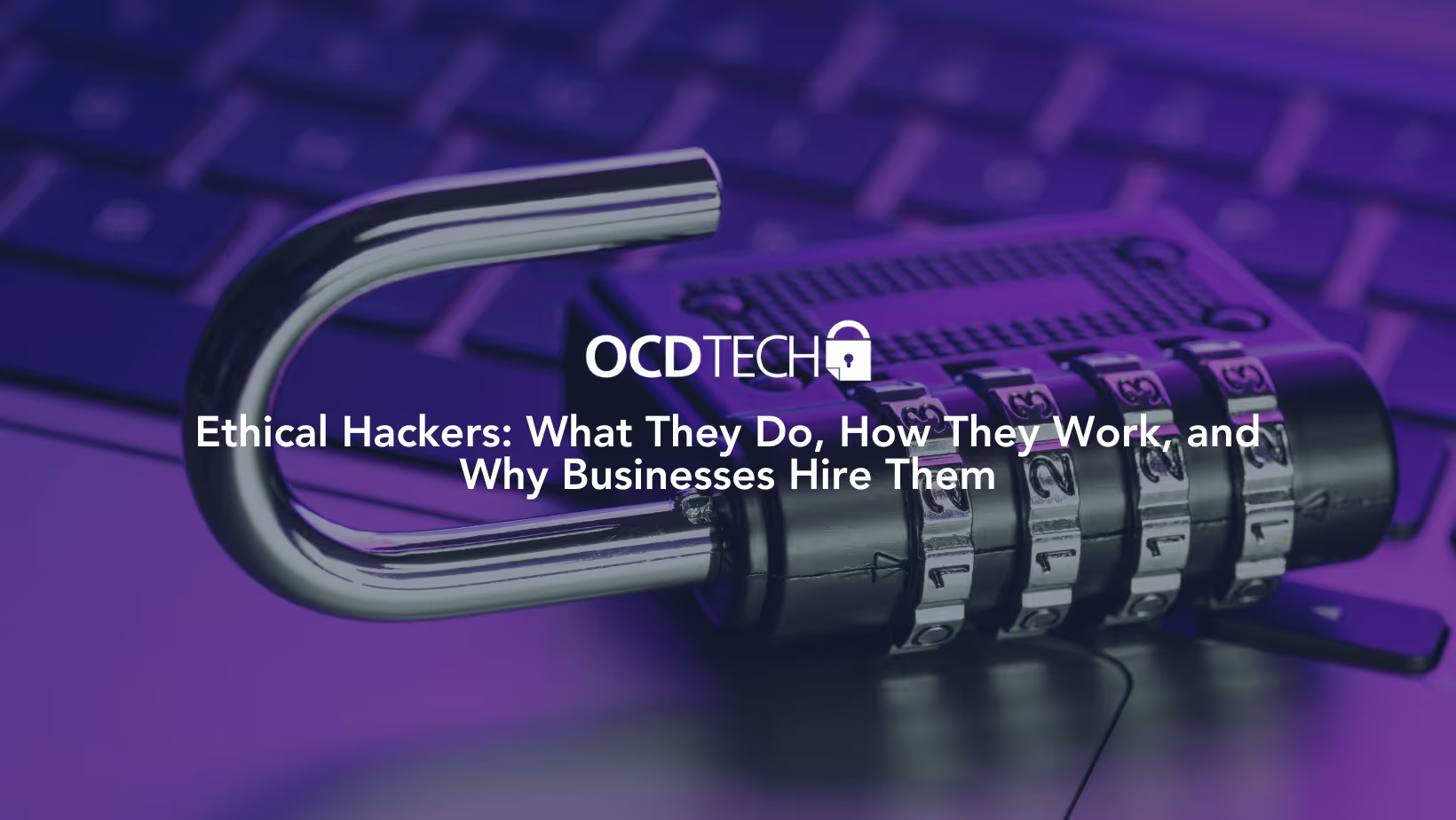By
OCD Tech
•
4
min read

In a world where cyber threats are becoming more sophisticated, businesses must stay ahead of potential security breaches. This is where ethical hackers come into play. But what exactly do they do, how do they operate, and why are they crucial for businesses today?
Ethical hackers, also known as white-hat hackers, are cybersecurity professionals who use their skills to protect organizations from cyber-attacks. Unlike malicious hackers who exploit vulnerabilities for personal gain, ethical hackers work to identify and fix these vulnerabilities before they can be exploited.
Ethical hacking is a legal and authorized attempt to locate and exploit vulnerabilities in a system. This proactive approach helps organizations improve their security posture. Ethical hackers are often employed by companies to test the robustness of their security measures and ensure that their data remains protected against unauthorized access.
Ethical hackers have a wide range of responsibilities, all aimed at improving an organization's network security. They conduct penetration testing, simulate cyber-attacks to find weak spots, develop security policies, and train employees on best practices for cyber safety.
They are also involved in incident response, working with IT departments to strengthen protocols and ensure the organization can respond effectively to any breach. Additionally, they participate in audits to ensure compliance with industry standards.
To become an ethical hacker, one needs a strong understanding of network security, operating systems, and programming languages. Certifications like Certified Ethical Hacker (CEH) and Offensive Security Certified Professional (OSCP) are often required.
They must also possess analytical skills and a deep understanding of hacker methodologies to anticipate and counteract attacks.
Before testing begins, ethical hackers gather information about the target system, its network architecture, entry points, and scope of testing.
Hackers use automated tools to identify system vulnerabilities through techniques like port and vulnerability scanning.
They simulate attacks using methods like SQL injection or phishing to assess how a real breach might occur.
Hackers attempt to remain undetected within the system to evaluate how long a real attacker might persist and test monitoring effectiveness.
Finally, they compile a detailed report outlining vulnerabilities, potential impact, and remediation recommendations. This includes a debrief with the IT team.
Ethical hackers help safeguard customer data, financial records, and intellectual property by identifying and closing security gaps.
They help businesses comply with regulations like GDPR, HIPAA, and PCI-DSS by uncovering security weaknesses and advising on corrections.
Preventing data breaches saves organizations from direct financial losses, reputational harm, and legal consequences.
A commitment to cybersecurity builds consumer confidence and reinforces brand reputation.
Ethical hackers keep businesses informed about new threats and help them implement timely defenses.
As technology advances, the demand for ethical hackers grows. With trends like AI, machine learning, and IoT security becoming more prominent, ethical hackers must evolve with the field.
Educational programs are expanding to meet this demand, and ongoing learning is critical as cyber threats become more advanced.
Ethical hackers are a cornerstone of modern cybersecurity strategies. By understanding what they do and how they work, organizations can better protect themselves in the digital landscape.
Their role is not just about preventing attacks, it's about building a resilient and trusted future for businesses and users alike.

Audit. Security. Assurance.
IT Audit | Cybersecurity | IT Assurance | IT Security Consultants – OCD Tech is a technology consulting firm serving the IT security and consulting needs of businesses in Boston (MA), Braintree (MA) and across New England. We primarily serve Fortune 500 companies including auto dealers, financial institutions, higher education, government contractors, and not-for-profit organizations with SOC 2 reporting, CMMC readiness, IT Security Audits, Penetration Testing and Vulnerability Assessments. We also provide dark web monitoring, DFARS compliance, and IT general controls review.
Contact Info
.svg)
OCD Tech
.svg)
25 BHOP, Suite 407, Braintree MA, 02184
.svg)
844-623-8324
.svg)
https://ocd-tech.com
Follow Us
Videos
Check Out the Latest Videos From OCD Tech!
Services
SOC Reporting Services
– SOC 2 ® Readiness Assessment
– SOC 2 ®
– SOC 3 ®
– SOC for Cybersecurity ®
IT Advisory Services
– IT Vulnerability Assessment
– Penetration Testing
– Privileged Access Management
– Social Engineering
– WISP
– General IT Controls Review
IT Government Compliance Services
– CMMC
– DFARS Compliance
– FTC Safeguards vCISO